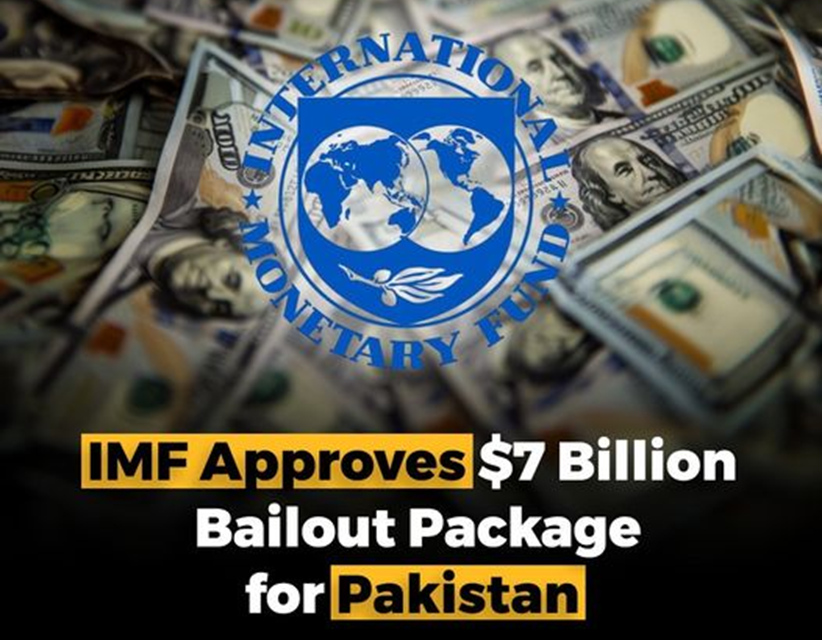- Courses
- GS Full Course 1 Year
- GS Full Course 2 Year
- GS Full Course 3 Year
- GS Full Course Till Selection
- Online Program
- GS Recorded Course
- NCERT (Recorded 500+ Hours)
- Polity Recorded Course
- Geography Recorded Course
- Economy Recorded Course
- AMAC Recorded Course
- Modern India, Post Independence & World History
- Environment Recoded Course
- Governance Recoded Course
- Science & Tech. Recoded Course
- International Relations and Internal Security Recorded Course
- Disaster Management Module Course
- Ethics Recoded Course
- Essay Recoded Course
- Current Affairs Recoded Course
- CSAT
- 5 LAYERED ARJUNA Mentorship
- Public Administration Optional
- ABOUT US
- OUR TOPPERS
- TEST SERIES
- FREE STUDY MATERIAL
- VIDEOS
- CONTACT US
Pakistan’s Recent IMF Bailout
Pakistan’s Recent IMF Bailout

On September 27, 2023, the International Monetary Fund (IMF) approved a $7 billion Extended Fund Facility (EFF) for Pakistan, marking the country’s 25th program with the IMF and the sixth under the current borrowing framework.
- This bailout comes as Pakistan grapples with severe economic challenges, and Prime Minister Shebaz Sharif expressed hope that this would be the last IMF program for the nation.
Reasons for Needing an IMF Bailout:
- Chronic Economic Challenges: Pakistan has long struggled with governance issues and fiscal mismanagement. Prior crises were exacerbated by the COVID-19 pandemic, the global impacts of Russia's war in Ukraine, and devastating floods in August 2022.
- Disruption of Previous Funding: The IMF halted a pending $1.18 billion disbursement under the previous 2019 EFF due to Pakistan’s failure to meet conditions such as raising energy prices, increasing taxes, and removing currency controls.
- Soaring Inflation: Inflation peaked at 38% in May 2023, driven by rising food and oil prices, causing widespread economic distress. The Pakistani rupee depreciated by about 20% against the U.S. dollar in 2023, and foreign exchange reserves fell below $3 billion.
- Emergency Measures: In July 2023, Pakistan secured a $3 billion Stand-By Arrangement (SBA) to stabilize its economy. The interim government aimed to meet the IMF's conditions regarding fiscal discipline and market-driven exchange rates.
Current Economic Status:
- By September 2024, inflation had decreased to about 7.5%, and foreign reserves rose to approximately $9 billion due to financial support from allies like China, Saudi Arabia, and the UAE.
- However, Pakistan’s external debt remains at about $130 billion, with $90 billion due over the next three years.
Details of the $7 Billion EFF Package:
- Purpose of the EFF: The EFF is designed to assist countries facing severe balance of payments issues, facilitating medium-term structural reforms. For Pakistan, this includes:
- Strengthening monetary and fiscal policies.
- Implementing tax reforms.
- Rebuilding foreign exchange reserves.
- Immediate Financial Relief: The IMF will immediately disburse $1.1 billion to support Pakistan’s liquidity needs.
- No Debt Restructuring: The EFF package does not include plans to restructure Pakistan’s external or internal debt, which is currently around 81% of the previous fiscal year’s tax revenues.
Conditions for Securing the IMF Funding:
- Financing Assurances: Pakistan needed confirmation of financing assurances from development partners, including China, Saudi Arabia, and the UAE, which agreed to roll over $12 billion of debt.
- Tax Reforms: The government committed to sweeping tax reforms, targeting an additional $6.5 billion in revenue. This includes:
- A 51% increase in electricity prices.
- Enhanced revenue generation through petroleum levies and electricity tariffs.
- Balanced Fiscal Spending: The IMF required balanced spending between federal and provincial governments, with new taxes on agriculture and no new subsidies.
Criticism of Conditions: Experts have described the IMF’s conditions as harsh. Concerns include:
- The potential widening of Pakistan's debt-to-GDP ratio, which stands at 77%.
- Lack of political will to support the sweeping reforms necessary for success.
- Skepticism about the effectiveness of the proposed tax reforms, with criticisms focusing on fairness and equity.
What are IMF Bailouts?
A bailout generally refers to providing financial support to an entity at risk of bankruptcy. In the context of countries, they seek bailouts from the IMF when facing macroeconomic risks, currency crises, or challenges meeting external debt obligations. Bailouts help countries secure essential imports and stabilize their currency's value.
Reasons for Seeking IMF Bailouts:
Countries often face economic crises due to various factors, including:
- Inappropriate Fiscal and Monetary Policies: Poorly managed economic policies can lead to high public debt, fiscal deficits, and large current account deficits.
- Weak Financial Systems: Vulnerable financial systems can trigger economic booms and busts.
- Political Instability and Weak Institutions: Governance issues can exacerbate economic problems.
- Insolvent Financial Institutions: Bank failures can significantly impact national economies.
For example:
- Sri Lanka and Pakistan have faced severe currency crises marked by skyrocketing domestic prices and declining currency value.
- In Sri Lanka's case, a drop in US dollar inflows due to reduced tourism during the COVID-19 pandemic also contributed to its crisis.
History and Purpose of the IMF:
- The IMF was established in 1945 to promote international economic coordination and prevent competitive currency devaluations.
- Over time, it evolved into a last-resort lender for countries in severe economic distress, providing financial assistance to stabilize economies.
How is an IMF Bailout Provided?
- The IMF extends financial support primarily through Special Drawing Rights (SDRs), a basket of currencies that includes the US dollar, Euro, Chinese Yuan, Japanese Yen, and British Pound.
- Assistance can come in various forms, including loans, cash, bonds, or stock purchases.
Lending Programs: The IMF has different lending programs tailored to specific needs, including:
-
Standby Arrangement
-
Extended Fund Facility
-
Rapid Financing Instrument
-
Flexible Credit Line
-
Resilience and Sustainability Facility
Five Steps of IMF Lending:
- Request for Support: A member country in financial distress submits a request to the IMF.
- Economic Assessment: The IMF staff engages with the country's government to assess the economic and financial situation.
- Program Agreement: Typically, the IMF and the country agree on a set of economic policies (policy conditionality) that the country must implement to receive assistance.
- Executive Board Approval: The agreed policy program is presented to the IMF’s Executive Board, including a "Letter of Intent" and a "Memorandum of Understanding." The board reviews and approves the financing.
- Monitoring and Compliance: After approval, the IMF monitors the implementation of the agreed-upon policies. Successful adherence ensures repayment of funds, making them available for future borrowing countries.
Conditions of an IMF Bailout Countries seeking IMF assistance often face several conditions, which may include:
- Structural Reforms: Such as fiscal transparency, tax reforms, and state-owned enterprise reforms. Critics argue these measures can be harsh on the public and driven by geopolitical considerations.
- Macroeconomic Conditions: Conditions are also tied to key economic indicators like monetary aggregates, fiscal balances, and international reserves.
Pros and Cons of IMF Bailouts Advantages:
- Economic Survival: IMF bailouts can stabilize economies during crises, keeping essential industries functioning and preventing complete economic collapse.
- Technical Expertise: The IMF provides guidance on implementing necessary reforms to strengthen economic frameworks.
Disadvantages:
- Austerity Measures: IMF conditions can lead to reduced government spending and increased taxes, which are often unpopular and can provoke public unrest.
- Dependency Concerns: Countries may become reliant on external funding, affecting their financial sovereignty and reputation among investors.
Sources of IMF Funding IMF funds originate from three main sources:
- Member Quotas: The primary funding source, where each member country’s quota is based on its relative economic size.
- Multilateral and Bilateral Borrowing Agreements: Additional financial support from member countries.
As of now, the IMF has approximately SDR 977 billion in resources, equating to a lending capacity of around SDR 713 billion (about USD 1 trillion). Major lenders include countries from the Paris Club (like the US, France, and Japan), as well as China, India, Saudi Arabia, South Africa, and Kuwait.
Delays in Funding Approval:
Delays in IMF funding can significantly impact countries in financial distress, as these funds are often essential for stabilizing economies and unlocking other financing sources.
- For instance, Sri Lanka experienced over 180 days of delays in securing a bailout after reaching a staff-level agreement. Similarly, Ghana faced an 80-day wait for board approval following a preliminary agreement.
Conclusion
Pakistan's recent IMF bailout highlights ongoing economic struggles rooted in poor governance and external shocks. While the EFF aims to stabilize the economy and implement necessary reforms, significant challenges remain, including political support and public acceptance of harsh measures. The success of this program will determine Pakistan’s economic trajectory in the coming years, with implications for its broader regional stability.

Must Check: Best IAS Coaching In Delhi
UPSC Prelims Result 2024 Out: Expected Cut Off & Other Details, UPSC Prelims 2024 Answer with Explanation, Daily Prelims Quiz, Daily Current Affairs, MONTHLY CURRENT AFFAIRS TOTAL (CAT) MAGAZINE, Best IAS Coaching Institute in Karol Bagh, Best IAS Coaching Institute in Delhi, Daily Mains Question Answer Practice, ENSURE IAS UPSC Toppers, UPSC Toppers Marksheet, Previous Year Interview Questions, UPSC Syllabus
PLFS 2025: Monthly Jobs Data, Bigger Survey

